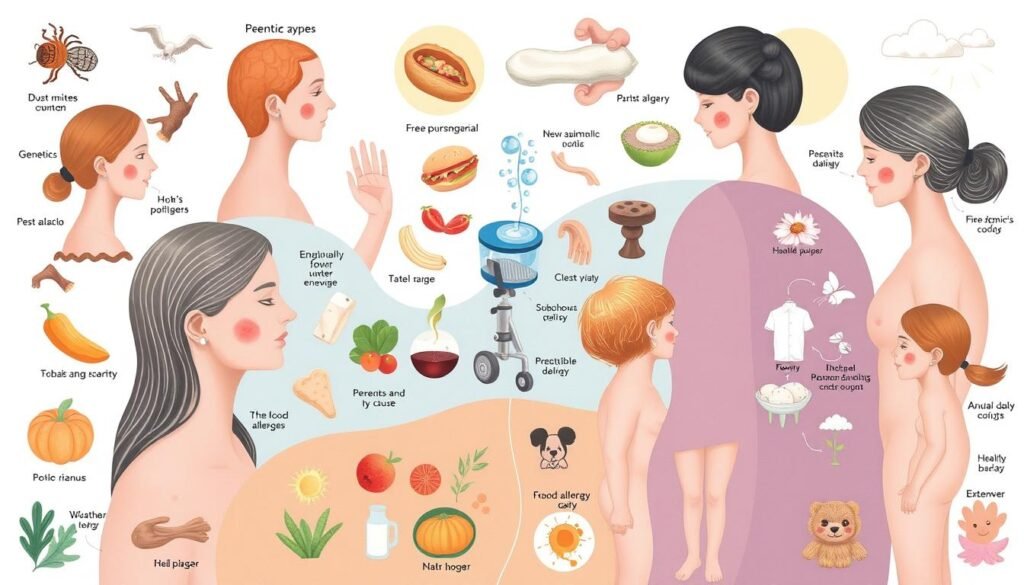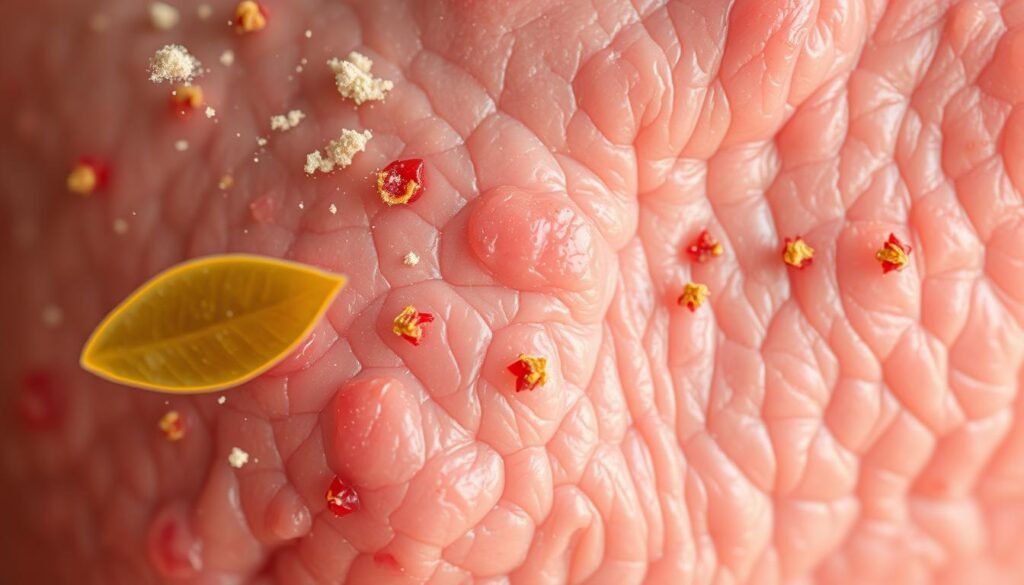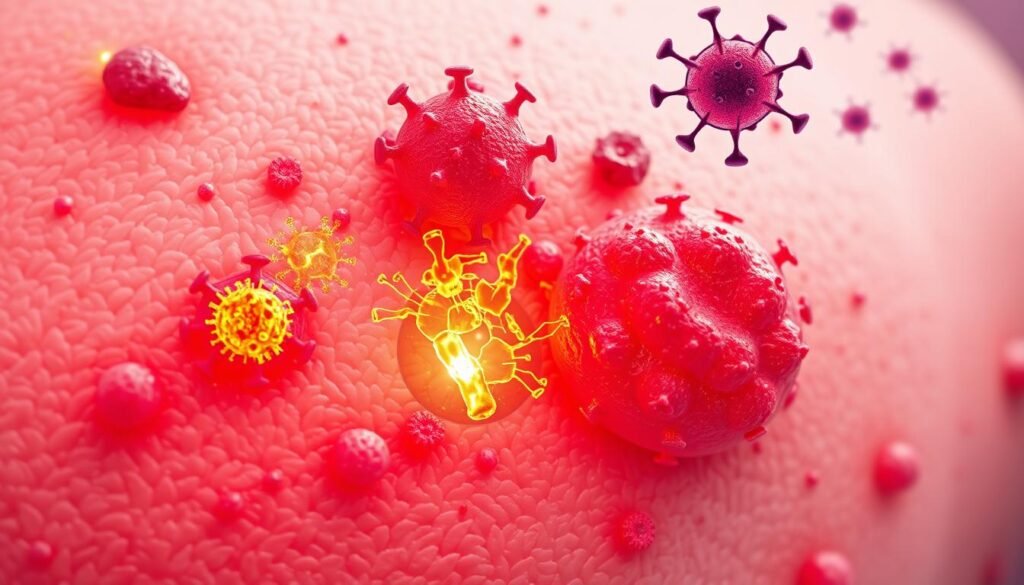Did you know about 10.1% of adults and 13.5% of children in the U.S. have eczema? This skin issue, or atopic dermatitis, is growing more common. It leads to itchy, inflamed, and red skin, hurting a person’s life quality. This article looks into genetics, environment, and lifestyle as eczema causes. It helps those affected and doctors to better understand and tackle this condition.
Key Takeaways
- Eczema affects more than 10% of the adult population in the U.S.
- A complex interplay of genetics and environment contributes to the condition.
- Understanding the risk determinants is crucial for effective management.
- Effective identification of causes and risk factors can aid in treatment.
- Both intrinsic and extrinsic factors play a role in eczema severity.
Understanding Eczema: A Brief Overview
Eczema is a common skin disorder that results in dry and itchy skin. It mostly starts in childhood but can occur at any age. This fact emphasizes the importance of knowing what eczema is. People may have different types of eczema, such as atopic dermatitis, contact dermatitis, and dyshidrotic eczema.
The symptoms of eczema can be mild or severe, affecting life quality deeply. The overview of eczema shows why tailored treatment is critical. It helps in reducing symptoms effectively.
Using moisturizers and knowing what triggers eczema are key in symptom management. A deep understanding of eczema’s forms helps doctors create the best treatment plans. This approach significantly aids those suffering from this condition.
| Type of Eczema | Characteristics | Common Symptoms |
|---|---|---|
| Atopic Dermatitis | Chronic, genetic predisposition | Itching, dry patches |
| Contact Dermatitis | Triggered by irritants or allergens | Redness, blisters |
| Dyshidrotic Eczema | Blisters on palms and soles | Intensely itchy blisters |
To learn more about eczema and its impact, check out this resource. Getting to know eczema better leads to improved management. It also raises the quality of life for those dealing with it.
What are the Causes of Eczema?
The causes of eczema are not simple. Knowing why it happens can help us handle it. Both our genes and things around us play big parts. They influence when eczema starts and how bad it gets.
The Role of Genetics in Eczema
Genes help predict if you might get eczema, especially if your family has a history of it. Some genes affect our skin’s defense against irritants and allergens. This makes some people’s skin react more and become more sensitive.
Environmental Triggers and Irritants
What’s around us can trigger eczema or make it worse. Soaps, cleaners, and air pollution often irritate the skin. Things like pollen, dust, and animal fur can also cause trouble. Knowing and avoiding these can reduce eczema problems.
Causes and Risk Factors
Eczema is a common skin issue that doesn’t just appear out of nowhere. Many predisposing conditions can affect its onset. Knowing these can help you manage eczema better.
Identifying Predisposing Conditions
If you have asthma, hay fever, or other allergies, you might be more prone to eczema. This link is part of the “atopic march,” which shows how allergic diseases can progress over time. Understanding these predisposing conditions helps doctors create personalized treatment plans.
How Allergies Affect Eczema Development
Allergies to foods or things in the environment are key in triggering eczema flare-ups. The link between Allergy and Eczema creates a cycle where eczema gets worse with allergic reactions. Tackling these risk factors can make treatments more effective.

| Predisposing Conditions | Impact on Eczema |
|---|---|
| Asthma | Increases risk of eczema development |
| Hay Fever | Contributes to allergic responses affecting skin |
| Food Allergies | May trigger eczema flare-ups |
| Environmental Allergies | Exacerbate existing eczema symptoms |
Understanding how allergies and eczema interact is vital for effective control. For more insights, visit this informative page.
The Impact of Skin Barrier Dysfunction
Skin Barrier Dysfunction is a big issue for those with eczema. It means the skin loses moisture, becoming dry and easily irritated. This makes the skin more prone to eczema flare-ups.
The Causes and Risk Factors of this condition are complex. They stem from genetics, the environment, and lifestyle choices. All these factors make skin conditions worse, leading to pain and irritation.
Today, new treatments aim at fixing the skin barrier. This is key for controlling eczema. Better skin health reduces eczema symptoms and improves life quality. With the right care, people can enjoy better health and comfort.
| Aspect | Impact of Dysfunction | Management Strategies |
|---|---|---|
| Moisture Retention | Decreased moisture, leading to dryness | Use of moisturizers and occlusives |
| Allergen Penetration | Increased sensitivity to allergens | Identifying and avoiding triggers |
| Inflammation | Pro-inflammatory environment worsening symptoms | Anti-inflammatory treatments and lifestyle adjustments |
| Dysbiotic Microbiota | Exacerbation of eczema severity | Restoring healthy skin microbiome |

Understanding the key role of Skin Health and barrier function is vital. It helps us better understand eczema. For more details, check out this comprehensive review.
Underlying Factors Contributing to Eczema
Eczema is not simple; it’s complex and involves many factors, especially the immune system. It’s crucial to know the Causes and Risk Factors behind eczema outbreaks. This knowledge helps in controlling and treating it. Problems with the immune system make the body react too strongly to certain things.
Immune System Abnormalities
The Immune System doesn’t work right in people with eczema. It overreacts to things that are not harmful. This leads to too much immune activity. It makes symptoms worse by causing ongoing redness and itchiness of the skin.
Discovering specific immune responses helps understand Eczema Mechanisms. Knowing these mechanisms helps doctors create personal treatment plans. Finding triggers in our surroundings is key to managing eczema well.

| Immune Response Type | Effect on Eczema | Common Triggers |
|---|---|---|
| Overactive Response | Increases inflammation | Dust mites, pollen |
| Allergic Reactions | Causes flare-ups | Food allergies, pet dander |
| Chronic Inflammation | Worsens skin condition | Dry air, irritants |
Risk Determinants for Eczema
Several risk determinants play a part in whether a person might get eczema. Being in a city can increase chances because of more pollutants. Also, eczema may get worse depending on the season.
Things like strong cleaners or soaps can trigger eczema. They harm the skin’s protective layer, causing irritation and swelling. Understanding these triggers is key to knowing why some people get eczema.
Your family history and past skin problems also affect your risk of eczema. Knowing these risk determinants helps doctors prevent and treat the disease. This can make life better for those dealing with eczema.
Etiological Contributors to Eczema
Eczema is a complex condition with several causes. Key factors are inflammation and the microbiome. Knowing about these helps manage the condition better.
Understanding Inflammation
Inflammation is crucial in eczema’s development. It leads to more skin damage and worsens eczema. This ongoing issue causes redness, itching, and discomfort.
Managing inflammation well is vital for people with eczema.
Microbiome’s Role in Skin Health
The skin microbiome is essential for healthy skin. A balanced microbiome protects against bad pathogens. However, an imbalance, or dysbiosis, is linked to eczema.
Keeping a healthy microbiome can help prevent and manage eczema. This shows how important gut and skin health are in tackling eczema.
Susceptibility Factors in Eczema Outbreaks
Eczema flare-ups can be tough, and knowing what leads to them is key for handling them well. If eczema runs in your family, you might be more likely to have it. This means it’s important to keep an eye on your skin.
Stress can make eczema worse, causing more irritation and discomfort. Changes in the weather, like dry winter air or summer humidity, also affect eczema. These conditions can make it hard for your skin to protect itself.
Your lifestyle choices, like what you eat and how you take care of your skin, are big factors too. Eating a balanced diet helps strengthen your skin. But, some foods might trigger eczema for certain people. Using gentle skincare products can ease symptoms. By knowing these factors, you can work to prevent eczema outbreaks. This helps keep your skin healthy and improves your quality of life.